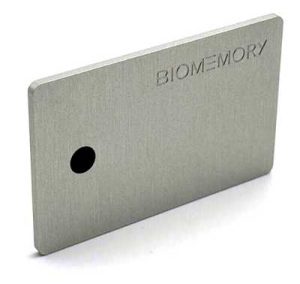Biomemory Unveils DNA Cards Portable Storage Media
At €1,000, will be produced in batches of 10 orders, with each one receiving 2 identical cards.
This is a Press Release edited by StorageNewsletter.com on December 15, 2023 at 2:01 pmBiomemory announced its DNA Cards, the 1st time DNA storage has ever been available for sale to the general public.
Available this year, the DNA Cards, whose credit card-sized format boast a capacity of 1KB of text data each, serve as proof of the practical ability to utilize molecular computing for storage needs, a departure from and more sustainable alternative to traditional silicon chips. The company, behind this unique format, ensures a minimum lifespan of 150 years, setting a standard in data longevity.
At a time when 1100,000EBs of data are created and consumed each year – a number set to double by 2025 – the need for new storage solutions has never been more urgent. Both the physical space as well as energy needs of digital data centers that store this data at present is unsustainable, with reports showing data centers use 200TWh of electricity and generate 3.5% of the global greenhouse gas (GHG) emissions. However, the company‘s DNA Cards utilize molecular computing, a technique harnessing synthetic DNA molecules for storage, which is thousands of times less energy-intensive as the electronic systems currently used.
Designed for practical applications, the DNA Cards will be produced in batches of 10 orders, with each order receiving 2 identical cards. This technology, protected by the firm‘s key patents and independently verified by renowned laboratory institution Eurofins Genomics, utilizes an efficient DNA builder designed in-house, an advancement over existing chemical or enzymatic synthesis technologies. Eurofins Genomics, in genomics, is a key supplier to the life science industry and supports the Biomemory project with a unique production design. Their global genomics approach aligns with Biomemory’s vision, and they provide the service through which DNA Card owners can access the information stored on their cards. This service ensures seamless and secure retrieval of data, enhancing the overall user experience.
While the DNA Cards are the first instance of the practical use of this storage technology, the company plans to scale up this DNA storage technology for data center usage. Looking ahead, in 2026 the company plans to release the Biomemory Prime, designed for integration into data centers with a planned storage capacity of 100PB, marking a step towards a sustainable and efficient digital future for storage. The firm envisions the practical use of this technology in combating climate change, offering extended data duration, reducing spatial footprint, and eventually surpassing traditional archival technologies in speed. The company’s forward-thinking approach aligns with its mission to make digital technology more environmentally friendly.
“The launch of our DNA Cards represents a significant milestone in the evolution of data storage technology,” Erfane Arwani, CEO, Biomemory, said about the pioneering development. “After years of talk about the potential of molecular computing, we are incredibly proud to bring the first DNA data storage product to market, that not only pushes the boundaries of innovation but also aligns with our commitment to environmental sustainability and efficiency.”















 Subscribe to our free daily newsletter
Subscribe to our free daily newsletter

